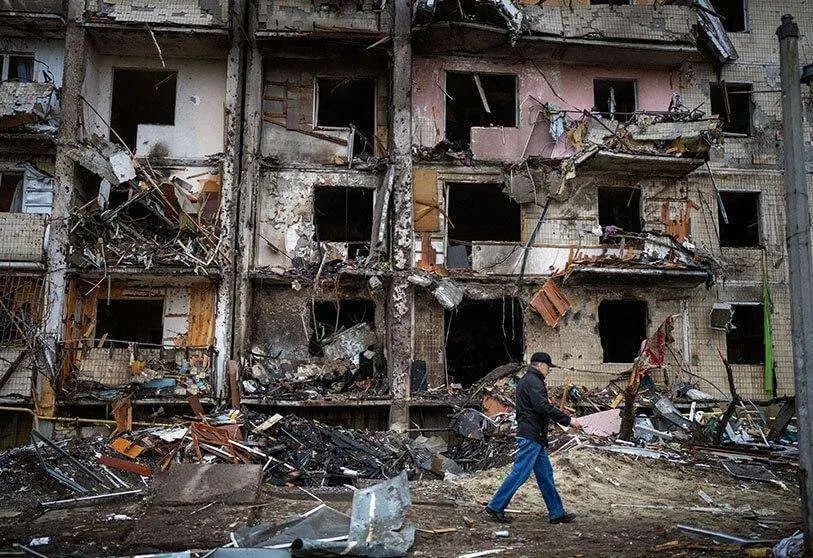Political astigmatism

We find ourselves at one of those delicate moments in history, one of those convulsive moments which have similarities with the antecedents of other human catastrophes and which, when reflected in the history books, will raise the following question among our descendants: did they not see it? Since the pandemic, which has gone dormant, the concatenation of imbalances, instabilities and anomalies has highlighted the fragility and shortcomings of our forms of social and political organisation, even if the pandemic has only highlighted them, as this had been going on for a long time. Now it is the turn of the war in Ukraine, with the main difference being that now it is not a virus that is being fought, but other human beings, which will make the consequences, as we can already see, even more dire.
In line with this, while reading two of José Saramago's most famous novels, I came across a very interesting conception of blindness and, despite the fact that these novels were written in 1995 and 2004, their message is timeless. Saramago talks about blindness, that is, the fact of not looking, but, above all, the fact of not seeing. Here we come across one of the virtues of our language, which, as with the verbs oír and escuchar, allows us to make a very subtle distinction insofar as we can hear without hearing, look without seeing or, against all odds, see without looking. This is why the role of the doctor's wife in Essay on Blindness embodies this paradox perfectly. These subtleties of language that Saramago boldly articulates allow us to analyse reality from a different perspective, allow us to identify that perhaps there are more blind people in our society than we think, perhaps our political leaders and their adversaries have been suffering from this rational pathology for longer than we think. In short, we can suffer from blindness even when our ocular apparatus is in perfect condition, even when we are able to see.
In line with this, in the aforementioned work, Saramago notes that there has always been fighting, fighting has always been, more or less, a form of blindness, and, in the same way as in the Essay on lucidity, it seems that we are now experiencing a second pandemic of political, human, mental blindness, or whatever one wants to call it. We are impassively witnessing the destruction of a territory, the agony of a civilian population that has found itself on the sidelines of a dispute in which it has little to say. I say impassive because, despite the mobilisation in favour of Ukraine, or rather, in opposition to Putin, which only serves to highlight the hypocrisy of Western discourse on freedoms, democracy and human rights, the way in which this conflict is being managed is exclusively militaristic and economic. Economic sanctions that seek to ruin the Russian state and which, surprisingly, have a boomerang effect, sending arms to an army whose command structures and area capacity have been annihilated and which, in turn, is made up of paramilitary militias that have been at war in the Donbass since 2014 and, finally, and the most obvious symptom of the blindness, the increasingly progressive use of the deterrent powers of nuclear weapons.
Since it is not a question of talking about who started it, who is to blame for all this, since a clear-sighted analysis would be able to establish that the responsibility for this conflict lies with Russia, but also with NATO, what we need is to look at this conflict from another perspective. It is the blindness in which we live that plunges Western democracies into a permanent contradiction when it comes to foreign policy. The contradiction is not in how we act, but in how we say we act and in the name of what we say we act. A clear example of this is the response to the Ukrainian refugee crisis, which has a terrifying reading on an ideological level, as it shows us that there are hierarchies of refugees, it tells us that the legitimacy of seeking asylum depends on your aggressor and not on your suffering.
Miguel de Unamuno is credited with the aphorism that recognises the positive quality of contradiction, since those who do not contradict themselves say nothing, but I believe that, in the current state of affairs, too much is said, too much, and not precisely within this positive polarity of contradiction. Our discourse is empty, it is superfluous, not because it does not respond to a carefully designed strategy with clear objectives, but because it lacks coherence, it does not generate confidence, one cannot read from these words the commitment that any discourse should embody. In this respect, the fact that the former president Jose Luis Rodríguez Zapatero pointed out in an interview with the newspaper El País that anything that is not realpolitik is not politics, that it is something else, contributes to this discredit.
In short, do we have to wait for Kiev to be devastated before negotiating again? Does the destruction of Ukraine not ensure its neutrality per se? Where is the limit to all this escalation of war? Perhaps we should start demanding more frankness from our political leaders, perhaps it would be interesting to reject dichotomous analyses of reality, perhaps it would be necessary to create a moral optometry service to graduate the lenses of those who, within the decision-making centres, have seen their dioptres increased.
rafaelarjonasoria@gmail.com

